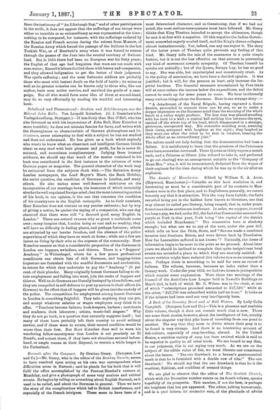Burmah after the Conquest. By Grattan Geary. (Sampson Low and
Co.)—Mr. Geary, who is the editor of the Bombay Gazette, seems to have resolved upon acting as his own war correspondent when difficulties arose in Barmah; and he pleads for his book that it will fulfil the office accomplished by the Provost-Marshal's camera at Mandelay, and give a photograph of some very anxious and critical events. He begins by telling us something about English Barmah, as it used to be called, and about the Burmese in general. Then we have the story of the complications which led to British interference, and especially of the French intrigues. These seem to have been of a most determined character, and so threatening, that if we had not acted, the most serious consequences most have followed. Mr. Geary thinks that Bing Theebau intended to accept the ultimatum, though he met it at first with a negative. Of this negative the Indian Govern- ment somewhat eagerly availed itself, and the King's throne collapsed almost instantaneously. Nor, indeed, can any one regret it. The story of the latter years of Theeban quite prevents any feeling of that kind. Mr. Geary tells the tale of the massacres in a quite simple fashion, but it is not the less effective on that account in preventing any kind of movement towards sympathy. Of Theeban himself he speaks not unkindly ; but of the Queen, &days Lay, he has no good to say. She was able, but unprincipled and monstrously cruel. As to the policy of annexation, we have here a decided opinion. It was justified ; but it will, for the present at least, only increase the Im- perial burdens. The financial measures necessitated by Free-trade Will at once reduce the income below the expenditure, and the deficit cannot be made up for some years to come. We hear incidentally many curious things about the Burmese. Here is one strange story :— " A detachment of the Naval Brigade, having captured a dozen daszoits, proceeded to execute them one by one, so as to make a deeper impression on the Burmese mind than the shooting of the whole batch at a volley might produce. The first man was placed standing with his back to a wall ; a conical ball striking him between the eyes, carried off the whole top of his head, which disappeared in a strange, grotesque, unexpected way. His comrades standing near, awaiting their turns, screamed with laughter at the sight ; they laughed as they went one after the other to be shot in rotation, treating the whole affair as an extraordinary joke."
The sailors could not help feeling that the demonstration had been a failure. It is satisfactory to learn that the pensions of the Princesses have been somewhat increased. Three Queens at thirty rupees a month each, and a Princess at fifteen (she refused to take it, and preferred to go out sharing) was an arrangement suitable to the " Company of Mean Men " who, it will be remembered, deducted from the wages of their engineer for the time during which he was up in the air after an explosion.














































 Previous page
Previous page